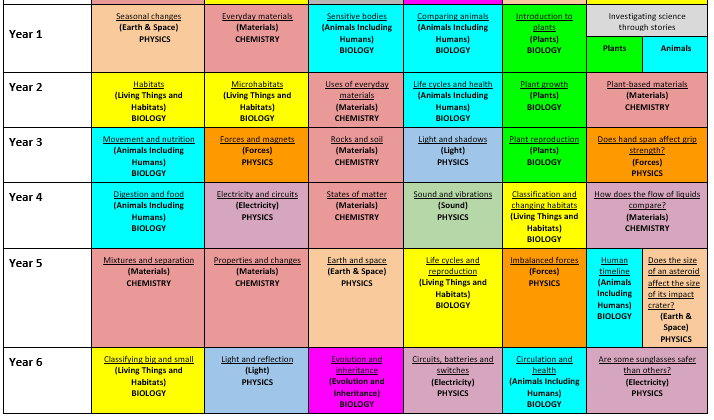Science
Science is a core subject alongside English and Maths where all teachers have worked together to design and implement cross-curricular activities that will enable children to embed their scientific knowledge and make vital connections.
Intent
The science curriculum aims to develop a sense of excitement and curiosity about natural phenomena and an understanding of how the scientific community contributes to the past, present and future. The curriculum aims for pupils to develop a complex knowledge of biology, chemistry and physics but also adopt a broad range of skills in working scientifically and beyond. The scheme of work is inclusive and meaningful so all pupils may experience the joy of science and make associations between their science learning and their lives outside the classroom. Studying science allows pupils to appreciate how new knowledge and skills can be fundamental to solving arising global challenges. The curriculum aims to encourage critical thinking and empower pupils to question the hows and whys of the world around them. The scheme encourages:
● A strong focus on developing knowledge alongside scientific skills across biology, chemistry and physics.
● Curiosity and excitement about familiar and unknown observations.
● Challenging misconceptions and demystifying truths.
● Continuous progression by building on practical and investigative skills across all units.
● Critical thinking, with the ability to ask perceptive questions and explain and analyse evidence.
● Development of scientific literacy using wide-ranging, specialist vocabulary.
Implementation
To meet the aims of the National curriculum for science and in response to the Ofsted research review: science, Kapow has identified the following key strands:
● Scientific knowledge and understanding of: ○ biology: living organisms and vital processes; ○ chemistry: matter and its properties; ○ physics: how the world we live in ‘works’.
● Working scientifically: processes and methods of science to answer questions about the world around us.
● Science in action: uses and implications of science in the past, present and for the future.
Kapow Primary’s Science scheme is a spiral curriculum, with essential knowledge and skills revisited with increasing complexity, allowing pupils to revise and build on their previous learning. A range of engaging recall activities promotes frequent pupil reflection on prior learning, ensuring new learning is approached with confidence. The Science in action strand is interwoven throughout the scheme to make the concepts and skills relevant to pupils and inspiring for future application. Cross-curricular links are included throughout each unit, allowing pupils to make connections and apply their science skills to other areas of learning. Each unit is based on one of the key science disciplines: biology, chemistry and physics. The National curriculum content has been grouped into six key areas of science to show progression throughout the school: Plants. Animals, including humans. Living things and habitats. Materials. Energy. Forces, Earth and space. Pupils explore knowledge and conceptual understanding through engaging activities and an introduction to relevant, specialist vocabulary.
As suggested in Ofsted research review: science (April 2021), the Working scientifically skills are integrated with conceptual understanding rather than taught discretely to provide frequent but relevant opportunities for developing scientific enquiry skills. The scheme utilises practical activities that aid in the progression of individual skills and provide opportunities for full investigations.
Teaching and learning is monitored through learning walks, book looks, pupil voice through school council and both internal and external moderations.
Our teachers provide half termly assessments on the children based on their professional judgement that is closely monitored by the subject lead.
We are confident that the activities produced are engaging, informative and that our partnership with the Unity Schools Trust will help to bridge the gap between primary and secondary science and will provide the children with strong foundations in science that they can push on from as they move into secondary education and beyond.

